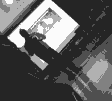











| d-i-n-a
events | metagallery
| netcultures |
|
| in italiano |
|
| NETCULTURES |
is a selection of texts that frame the projects invited at d-i-n-a's events, casting light over their context and the links between social change, public visibility, ownership in knowledge exchange, and the dynamics of information flows. |
|
The Liar's Poker by Brian Holmes (2003) " Basically, what I have to say here is simple: when people talk about politics in an artistic frame, they're lying. " |
|
|
The Conquest of Cool by Thomas Frank (1997) A exemplary excerpt from a book about the co-optation of US hip cultures in the business empire in the 60s. What kinds of tensions and bonds exist between counter-cultures and consumer cultures? What happens when alternative styles enter the business domain? Thomas Frank, a US journalist, gives some insight on "the genesis of counterculture as an enduring commercial myth" which recurs throughout post-sixties culture. |
Digital resistance by Critical Art Ensemble (2001) "Digital resistance" - whose Introduction is translated and presented here - is a recent book by Critical Art Ensemble, a U.S. based collective of artists/thinkers which deeply influenced a whole scene of activists and artists working with digital technologies in the political and social arena. |
Software art by Florian Cramer e Ulrike Gabriel (2001) A text about the importance of code writing in the transformation of contemporary artistic practices. Jurors for the 2001 edition of the Transmediale festival, the authors are key figures of the Berlin media cultures. |
The XYZ of Net Activism by Luther Blissett (1999) "Hybridisation is not about just connecting the virtual and the "street". We risk to remain rhetoric and predictable on both the fronts. We have to hybridize and to contaminate the forms of pop culture to create pop modules for activism." |
A post-media aesthetics by Lev Manovich (2000) On how digital communications technologies ultimately question the traditional categories of medium-based art and mass vs. high culture. In Manovich's view, data processing is the key factor of a radically new way of approaching creation, not only in the field of computer science. Manovich teaches at the University of California San Diego. |
Game Patch - Son of scratch? by Erkki Huhtamo (1999) An early text about videogames modifications, drawing a revealing connection between the creation of alternative videogames patches and the 80s phenomenon of scratch video, both seen as an autonomous and "tactical way of (mis)using popular media. Huhtamo is a professor at US and Finnish univerisities. |
Fast, Cheap and out of control by Timothy Druckrey (2002) |
|
|
![]()
Gateways to
DIGITAL MEDIA ECOLOGY
* * * * * * * *
Nettime
Indymedia
Next 5 Minutes
The
Thing
Metamute
World-Information
Slashdot
Adbusters
Rhizome
Cryptome
* * * * * * * *